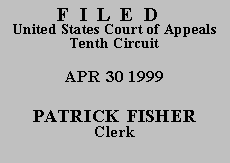

| PETER HANSELL,
v.
TIM LEMASTER, Warden, New Mexico State
Penitentiary; ATTORNEY GENERAL FOR
THE STATE OF NEW MEXICO |
|
Before BRORBY, EBEL, and
LUCERO, Circuit Judges.
After examining the briefs and appellate record, this panel has determined
unanimously that oral argument would not materially assist the determination of
this appeal. See Fed. R. App. P. 34(a)(2); 10th Cir. R. 34.1.9(G). The case is
therefore ordered submitted without oral argument.
Appellant Peter Hansell, an inmate appearing pro se, appeals the district court's denial of a certificate of appealability and dismissal of his petition for a writ of habeas corpus as time-barred under 28 U.S.C. § 2244(d). We deny Mr. Hansell's certificate of appealability and dismiss the appeal.
On June 19, 1995, pursuant to two plea agreements, a New Mexico state district court convicted Mr. Hansell on one count each of trafficking cocaine, possession of methamphetamine, and forgery. The state district court then sentenced him to a term of imprisonment totaling fourteen and one-half years. The state district court later denied Mr. Hansell's two motions for reconsideration and on April 4, 1996, denied his motion to withdraw his guilty plea. On May 12, 1997, Mr. Hansell filed a state petition for writ of habeas corpus relief, which the state district court dismissed May 13, 1997. On June 9, 1997, Mr. Hansell filed a petition for a writ of certiorari, which the New Mexico Supreme Court denied June 17, 1997.
On September 15, 1997, Mr. Hansell filed his § 2254 petition challenging his conviction and sentence. In support of his petition, he alleged ineffective assistance of counsel based on his attorney's alleged failure to tell him about favorable, exculpatory evidence and refusal to move to withdraw his guilty plea prior to the imposition of his sentence.
The district court referred Mr. Hansell's petition to a magistrate judge who recommended dismissal of the petition as time-barred under § 2244(d) of the Antiterrorism and Effective Death Penalty Act of 1996. The magistrate judge determined the deadline for filing Mr. Hansell's petition fell on April 23, 1997 well before September 15, 1997, when he actually filed his petition. The magistrate judge reasoned that because no state collateral proceeding was pending from April 4, 1996, when the state court denied Mr. Hansell's motion to withdraw his guilty plea, until he filed his state habeas petition on May 12, 1997, the period of limitation for Mr. Hansell's petition could not be tolled. On July 17, 1998, the district court adopted the magistrate's recommendations and dismissed the petition. The district court also denied Mr. Hansell's request for a certificate of appealability.
On appeal, Mr. Hansell claims the Antiterrorism and Effective Death Penalty Act of 1996 does not apply to him because he "was neither [a] Terrorist [nor sentenced] under [the] death penalty." He also renews his argument alleging ineffective assistance of counsel which he summarily claims deprived him of due process.
We review de novo the legal basis for the district court's dismissal of Mr. Hansell's § 2254 petition. See Jackson v. Shanks, 143 F.3d 1313, 1317 (10th Cir.), cert. denied, 119 S.Ct. 378 (1998). The Antiterrorism and Effective Death Penalty Act establishes a one-year period of limitation for filing all habeas corpus petitions. See 28 U.S.C. § 2244(d)(1); Hoggro v. Boone, 150 F.3d 1223, 1225 (10th Cir. 1998). Consequently, the provisions of the Act apply to Mr. Hansell. For prisoners like Mr. Hansell, whose conviction became final before April 24, 1996, the one-year statute of limitations begins to run on that date and ends April 23, 1997. Hoggro, 150 F.3d at 1225. Thus, the magistrate judge correctly determined Mr. Hansell's petition became due April 23, 1997.
Under § 2244(d), we toll the one-year limitation period for the time Mr. Hansell spent seeking state post-conviction relief. Id. at 1226 (citing 28 U.S.C. § 2244(d)(2)). Tolling occurs for the period "during which a properly filed application for State post-conviction or other collateral review ... is pending." 28 U.S.C. § 2244(d)(2). In this case, we cannot count the additional time Mr. Hansell spent seeking post-conviction relief because he did not seek this relief until May 12, 1997, well after the statutory limitation period ended on April 23, 1997. Thus, Mr. Hansell's untimely post-conviction pleadings do not toll the limitation period.
Because Mr. Hansell's § 2254 petition became due April 23, 1997, he did not file his petition until September 15, 1997, and no collateral state proceeding tolled the limitation period, we find his claim time-barred under 28 U.S.C. § 2244(d).(1) In addition, based on our review of the record, we conclude Mr. Hansell fails to make a substantial showing of the denial of a constitutional right as required by 28 U.S.C. § 2254. See Lennox v. Evans, 87 F.3d 431, 434 (10th Cir. 1996), cert. denied, 117 S. Ct. 746 (1997).
Accordingly, we deny Mr. Hansell's application for a certificate of appealability and DISMISS his appeal.
Entered by the Court:
WADE BRORBY
United States Circuit Judge
*. This order and judgment is not binding precedent except under the doctrines of law of the case, res judicata and collateral estoppel. The court generally disfavors the citation of orders and judgments; nevertheless, an order and judgment may be cited under the terms and conditions of 10th Cir. R. 36.3.
1. The state district court denied Mr. Hansell's motions for reconsideration and to withdraw his guilty plea prior to when the limitation period began on April 24, 1996, and therefore, these filings did not affect nor toll the one-year judicially-created limitation period running from April 24, 1996 to April 23, 1997.